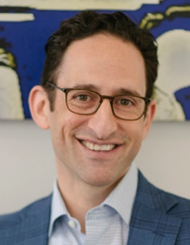 Name
Name
Title: CEO & founder
Company name: Asset-Map
Website: https://www.asset-map.com/
How did you personally become involved in fintech?
I have been a financial advisor for the last 20 years and it was not my original intention to get involved in the fintech space. I solved the challenge of delivering complex advice at my firm by focusing on what the customer really wanted, which was more clarity around whether or not they were set financially.
I provided that clarity using custom visualizations of households because I found that most people just didn't have the attention span, or the interest, in diving deep into the detailed reports our firm generated. They really wanted to get a better understanding of their life while also feeling like they could get some sense of control over their financial decisions. By visualizing their household on one page, we then moved to interactive smart boards and eventually to screen-sharing meetings over 10 years ago.
As advisors began finding technology creeping more and more into their customer experience, they started learning about Asset-Map. Soon after, it grew virally to several thousand advisors around the world. My choice to leave the financial services business as a full-time advisor to run Asset-Map and be an advocate for technology in the financial services space was ultimately how I got into fintech. And I have to say, I love my second career helping other advisors achieve an acceleration of their success and improve their customer experience.
What area's of fintech do you believe will grow the most in the coming 5 years?
The area of fintech that's getting a lot of attention is clearly data and artificial intelligence. Financial advisors and their firms are trying to create more efficiencies and engage their clients by delivering proactive advice while capturing wallet share across multiple lines of business.
At Asset-Map, we're also investing in these areas because we can't avoid the benefits provided by a data-driven understanding of a clients' gaps and financial progress. But I think the area tied to data-driven insights that is starting to get some recognition is the actual interaction environment between an advisor and their client. Where most companies have focused on investing in less human interaction through client and advisor portals, Asset-Map has doubled-down on where the value proposition is the greatest: advisor-client interactions. Many financial technologists will speak to a human-centric experience, but there is nothing quite as human as an actual review meeting either in-person or over screen-sharing.
We call this the point of advice. In retail environments, we typically called this the point of sale. This means that the most memorable and valuable part of the relationship between an advisor and client is usually the recurring meeting. And like most services, the customer experience has to be exceptional and memorable in order for it to earn ongoing value to the client.
What do you believe the next major innovation in financial technology will be and why?
I think that the next major innovation coming out of firms is being able to solve a very specific problem. We've seen a lot of the larger fintech firms focus on doing multiple aspects of an advisor practice management in what we tend to call all-in-one platforms. These platforms really have to compete on cost, user experience, and a seamless transition of data within the platform. But I think the best innovation is still in what I call value-adds and practice multipliers.
We have seen companies like Asset-Map, Riskalyze, LifeYield, Mobile Assistant, Everplans, and recently Holistiplan attempt to solve a specific pain point in the advice delivery space. I think that these organizations that tend to focus on their core competence provide a fantastic complement to the all-in-one platforms that are dominating the tech conversation. These companies are the ones that advisors should be really focusing on adding once their core technology stack is in place. As financial advisors acquire the same core technology, it will be the differentiation in value-adds that they provide to their customers that will really transform the consumer value proposition.








